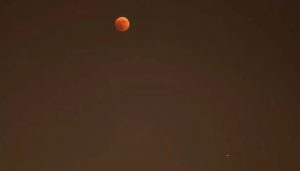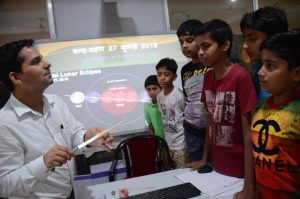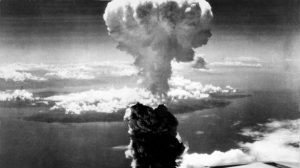The TrickyScribe: Longest total lunar eclipse of the century entranced skywatchers around the globe on Friday which was preceded worldwide by events for creating awareness with respect to the phenomenon.

Eclipse, as visible in Rome
With totality lasting for an incredible 1 hour and 43 minutes, this eclipse clocked in only 4 minutes shorter than the longest possible such event. The duration let viewers from around the globe view the phenomenon, with skywatchers gathering at observatories across the totality zone and those with unlucky geography tuning in to live streams.
The unusually long duration of the eclipse was caused by a few different celestial factors. The moon was near its farthest point from Earth and orbiting slowly, making it appear smaller and take longer to travel through Earth’s shadow. In addition, Earth was near its aphelion, the point in its orbit farthest from the sun, making its shadow appear larger.
The eclipse officially began at 1714 GMT, as per NASA, and the moon slowly crept into Earth’s shadow and began first to darken, and then redden. The real show, however, started at 1930 GMT, when totality began, and the moon was fully ensconced in Earth’s shadow and European Space Agency astronaut Alexander Gerst captured an iconic view of the lunar eclipse from the International Space Station as used in the feature image of this writeup.
READ MORE: Earth sciences no longer boring!
Because of the timing, daylight meant skywatchers in North America and most of South America missed seeing the phenomenon in person. But astronomers armed with telescopes around the world shared their views and their enthusiasm.
“On the left, you have the marvelous amazing Colosseum, at least a detail, and the rest of the scenery is just showing the moon,” Gianluca Masi of Virtual Telescope Project said during the organization’s live stream of the event, which shared the view of a telescope located at the ancient Roman Forum. “Look, friends, this is honestly amazing,” he added shortly before totality began.
READ MORE: Crackers taking toll on child health
“It’s impossible to keep these emotions in sight because this experience is so huge,” Masi said shortly after the time of the greatest eclipse.

Students being tutored at Shrikrishna Science Centre, Patna
The moon remained fully eclipsed until 2113 GMT, with the eclipse at its greatest at 2021 GMT. The event officially ended at 2328 GMT, when the moon fully departed Earth’s shadow.
The lunar eclipse is only half of the day’s celestial spectacle: Skygazers also get an incredible view of a bright Mars, which is in opposition today.
Earthlings will next see another total lunar eclipse on Jan. 21, 2019, and unlike this event, that eclipse will be visible only to North American viewers.
Total Views: 2,75,315





















